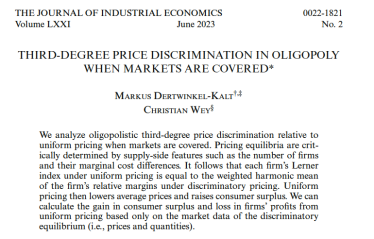Price discrimination and geoblocking - new publication in the Journal of Industrial Economics

When different customer groups pay different prices for the same goods and services, this is referred to as third-degree price discrimination. Companies use this common practice, for example, to charge different prices for digital products in different countries of the EU. This requires geoblocking, i.e., restricting access to online content or services based on the user's geographic location. Such geoblocking (and thus also third-degree price discrimination) has been successively made more difficult by the European Union in recent years as part of its internal market strategy. Markus Dertwinkel-Kalt of the University of Münster and Christian Wey of the HHU Düsseldorf analyze the effects of such price discrimination by oligopolists and thus also the effects of the Commission's Geoblocking Directive. In particular, they show that such price discrimination lowers consumer welfare and thus that the European Union's Geoblocking Directive benefits consumers. The results have now been published under the title "Oligopolistic Third-Degree Price Discrimination When Markets Are Covered" in the Journal of Industrial Economics.

